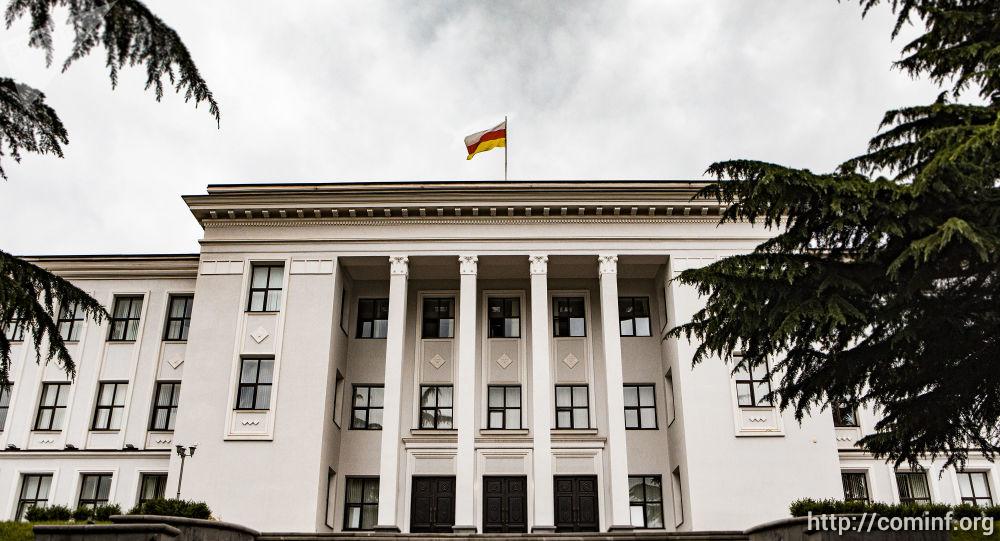A few hundred protesters have reportedly gathered at a rally in downtown Tskhinvali, organized by four opposition political parties, including Nykhas, Unity of Nation, People’s Party and the Communist Party, demanding the resignation of the region’s prosecutor general Uruzmag Jagaev and fair investigation into the alleged torture-death of young inmate Inal Jabiev.
‘MP’ David Sanakoev addressed the audience, noting that the ‘lawmakers’ had not yet received a response from Anatoly Bibilov, the region’s leader, on Jagaev’s dismissal. Sanakoev said “except for eight people, no one has yet been detained in the case of Inal Jabiev, and those who gave orders must be brought to justice.”
The protest comes as Anatoly Bibilov, the Kremlin-backed leader of Tskhinvali region/South Ossetia travels to Moscow together with Abkhaz leader Aslan Bzhania for a working visit.
The rally marks yet another event of an ongoing crisis in the Russian-occupied region, that started to unfold on August 28, when hundreds of people rallied in Tskhinvali in response to the alleged torture-death of Inal Jabiev, detained for the attempted murder of the occupied region’s interior minister Igor Naniev. Bibilov dismissed his “government” on the same day following protests, and 7 were detained linked to the case later.
Despite Bibilov’s pledges to hold perpetrators accountable, the public, joined by the opposition, have been pressing on with their demands for the resignation of Bibilov himself, as well as Jagaev.
Other Victims of Assault
Two other criminal cases were started in September as part of ongoing investigations into Jabiev’s death: Gersan Kulumbegov and Nikolai Tskovrebov, who were detained into the attempted murder of Naniev along with Jabiev, reportedly were also subjected to severe beatings in the South Ossetian criminal police unit.
Tskovrebov, 30, according to the medical records, was initially hospitalized with a closed skull-brain injury, concussion and multiple bruises. As noted by Bibilov’s press service, he may be sent to Moscow from Tskhinvali for further medical treatment.
According to the latest reports of September 9, Tskhinvali’s health authorities approached their North Ossetian colleagues to consult on subsequent treatment plans.
Tskhovrebov, who was delivered to the identification room “on hands” due to his inability to move independently, identified one suspect in the physical assault – Atsamaz Naniev, senior assignee of the internal affairs directorate of the city of Tskhinvali. Naniev was placed under detention, facing up to 15 years in prison on charges of intentional infliction of a grave injury.
Counter Protests
Bibilov’s “United Ossetia” party leaders publicly denounced attempts by opposition forces to take advantage of the situation, including through an ultimatum to the “president.” In a counter-rally on September 4, supporters of Bibilov called on their opponents to “stop working towards splitting Ossetian people”.
The opposition was again slammed for misusing the tragedy for their political aims in a public statement released on September 7 by the former “MPs” from Tskhinvali’s very first parliamentary convocation. Nine former “lawmakers” spoke against the regime change, offering their intermediary role to arrange a meeting between the “president” and the opposition leaders.
Some of the incumbent “lawmakers” showed less interest in cooperation, including by ignoring the Bibilov-proposed initiative on forming a parliamentary commission to investigate Jabiev’s death. As reported by RES on September 8, the commission could not be established due to low attendance.
Earlier Concerns on Prison Abuses
Earlier reports of violence in Tskhinvali prisons show that Jabiev’s death far from being an isolated case. The Public Defender of Georgia has been voicing concerns over embedded abuses in Tskhinvali prisons for years, pointing at beatings, ill-treatment, and torture in temporary detention facilities and prisons of the occupied region in the annual report.
The leaked footages from October 2019 provided evidence of violations, showing the beating of prisoners on a hunger strike by Tskinvali police. The strike was sparked by a decision to apply Russian laws in Tskhinvali prison, thus significantly restricting the rights of inmates.
Tskhinvali detention facilities have also become a destination to hundreds of Georgians for many years now. 86 Georgians have been arbitrarily detained from the dividing line to Tskhinvali only in 2019.
Archil Tatunashvili, a thirty-five-year-old Georgian citizen, was one of the most notorious recent Georgian victims who was reportedly tortured to death at the hands of the Russian-backed authorities in Tskhinvali.
This post is also available in: ქართული (Georgian) Русский (Russian)

